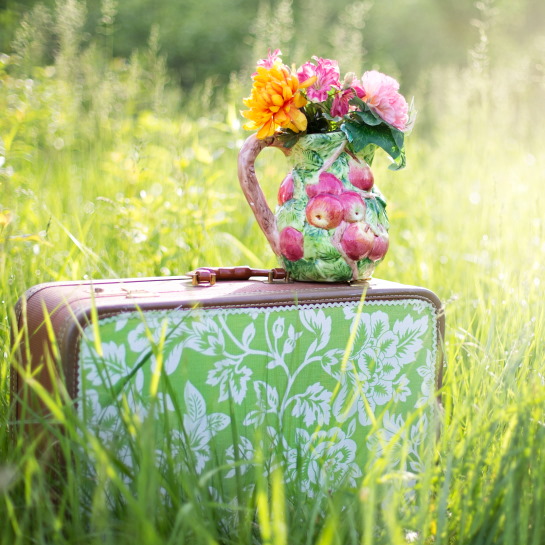
What it means to be a responsible tourist

As late as last year's travel trends, travelling was seen as an activity with nothing but positives attached. Travel is good for the soul, broadens your cultural horizons, throws you out of your comfort zone, enhances the family bond, and even better, you can make so many of your dreams come true while on holiday!
Enter Greta Thunberg's world-wide climate change campaign, and the global epidemic which has stopped any sort of travel (including to and from work) pretty much in its tracks.
The teenage activist from Sweden has inspired an international movement to do better, radically. Her voice resonates loudly across the globe. In the interest of our future and that of our off-spring through future generations, we need to listen.
Most types of travel is damaging to the environment.
Since the young Swede's "School strike for climate" campaign, suddenly we're Googling "How did Greta Thunberg get home from New York?" and "Is Greta Thunberg vegan?"
These questions imply a genuine curiosity. It shows we're struggling with the details hiding behind the big picture of global actions and activism. Because... we've been recycling for years and we're saving hard for that electric car. What more is there? What more can we do? And how can we do it while on vacation? Or even commuting! And, does what I do - or don't do - have that much of an impact on the big picture?
Enter the pandemic.
One incredible benefit to lockdown that even Ms. Thunberg couldn't have foreseen, is that our planet was well and truly gifted a much needed respite from humanity. We can see, hear, and feel just how heavy is our carbon footprint. More than ever we are aware just how polluted our world had become. One look around social media shows that our sunrises and sunsets have blossomed from hazy yellows, to an explosion of deep reds and purples. In the blink of an eye, these daily joys became a snapshot reminder that without our foot on the accelerator, the environment began to heal!
So, now what? What when the world returns 'back to normal'? How do we not screw it all up again? What does travel in a world concerned with climate change, animal welfare, mass tourism, and economic well-being, look like?
TO FLY OR NOT TO FLY
Flying contributes to greenhouse gasses significantly, but air travel is more efficient than travel by car in most situations. We think nothing of the environmental impact of our trip to the store or commuting to work, then worry about being green when we want to go on a vacation. Truth is, all forms of transit are efficient only if fully occupied...most cars can carry 5 passengers, but on average there are only 1.6 passengers per vehicle. If a flight is full, it greatly increases the carbon efficiency per passenger-kilometer. Flights happen whether they are full or not - so, if you don't choose to travel, the planes are still flying. Only if enough people chose not to travel, for a long enough period of time, would the airlines cease service to a destination. Unfortunately the low-budget air carriers make flying to multiple destinations in one year much too easy and feeds mass tourism. If you do decide to have a flying vacation, here are a few ways to reduce the carbon footprint:
- make it a longer trip instead of several shorter ones. Longer vacations have the benefit of truly de-stressing, cheaper accommodations through long-term rentals, and greatly reduces your carbon footprint.
- book a direct flight rather than layovers. Layover flights are much cheaper, but increase your carbon footprint significantly.
- bigger air carriers use new(er) aircraft which fly more ecologically -> book direct with renowned airlines
- fly commercial, not private
- pack lightly
- take the train instead. If you use a train powered by electricity generated by renewables, it's almost as good as riding a bicycle. Travel by high-speed train is super comfortable and fast at a fraction of the cost. Plan ahead for best rates.
- make a carbon-offsetting donation to benefit green technologies and sustainability research
- donate airmiles to offset your flight emissions (some airlines have programs)
'Flight shaming' is currently a popular thing for a certain type of pseudo-green person. But it's not the flights that are killing the planet - it's the cars and the shipping industry and disposable products.
Respect your hosts
There's much you can do here and it's really no different than what you can be doing at home to live more environmentally conscious. You can start by choosing environmentally friendly accommodations and hosts e.g. ecofriendly construction, providing solar -and wind energy
- Keep water use to a minimum especially in a drought e.g. short showers, use gray water in the garden etc.
- Keep energy use to a minimum (electricity, water heater, run a full dishwasher, air-dry clothes)
- Use environmentally friendly soaps and products
- Pack like-colored clothing to reduce laundering
- Reduce trash by shopping smarter and being a mindful consumer (e.g. reusable coffee cup instead of disposable ones)
- Reduce the use of plastics
- Recycle... but avoid the need for recycling

EAT Local
Eating local food is one of the best ways to live a more eco-conscious life anywhere. Local food is more energy -and cost efficient to be brought from farm to table. Plus it supports the local economy.
- Avoid disposable packaging when you're on the road.
- Supermarkets in France are usually very good at marking the origin of their products. Buy produce and meats from local producers.
- Eat at local restaurants rather than chain restaurants (and finish your meal)
- Choose a local restaurant that also uses local products. Ask your hosts or research websites of neighborhood restaurants
- If you're going to drive somewhere special to eat, loop in some sightseeing or another activity as well
- Drink wines from local vineyards or craft beers from local microbrewers
ACTIVITIES and Souvenirs
- Dump your bucket list, unless you can tick many of your boxes in one compact location.
- Spend your travel budget in your destination's community.
- Buy local artisanal products that are not damaging to the environment in production and consumption as souvenirs.
- Choose wines from a local winery that embraces sustainable cultivation
- Hire local transport or a local tourist guide to take you around e.g. hire a taxi instead of a car
- Choose walking and cycling family activities over activities that leave a heavy footprint
- Participate in an eco-project at your destination e.g. plant a tree, pick up trash where you see it (always carry some gloves and a trash bag). Projects like this will become more common.

- Practice a hands-off approach: leave flora and fauna alone and stay on the beaten path
- Sun protection products contain damaging chemicals. Protection against UV is necessary, but look for alternatives e.g. hats, shades, and protective clothing
- Visit nature preservation parks with rangers to guide you.
Being pseudo-green versus living green
'Flight shaming' is currently a popular thing for a certain type of pseudo-green person. But consider, if you want to be a green traveller, don't buy a new car (electric or not), keep your fridge, dishwasher, oven, television, etc. until they are used up. The impact of shipping goods across the ocean goes far beyond the impact of travel. Those goods riding around on container ships, burning the worst grade of crude oil with minimal regulations - those cars, fridges, etc. are doing your travelling for you! It's on you. So, if you stretch out the lifespan of your goods, you are effectively being a green 'traveller'.
Recycling is also a pseudo-green thing. Almost nothing that is sent to recycling ends up being recycled. Unless you're buying something made from recycled materials, it's just trash. Since 2018, China stopped accepting most of the 'recycling' which was being sent overseas...so now the dirty 'secret' is that our recycling ends up in the land fills here, rather than in land fills in China. What do you do? Don't buy the product in the first place. Choose the option which is responsibly packaged, buy repairable products. Recycling doesn't erase the guilt. One of the worst challenges for the planet is the myth that 'recycling' means putting your plastic in the right bin.
One thing to remember is that responsible travel will reflect in a dynamic shifting of our habits over time. What's true this year will have morphed into something different next year. Much will depend on how we experience travelling more consciously and how society as well as technology evolves. One person's idea of "green living" will not be another person's idea of green living (e.g. meat vs no meat, or even vegetarian vs vegan). Truth is, we didn't get to the dire situation we are in overnight, and change isn't going to happen overnight either.
So, how do these things apply to being a responsible traveller? First, don't fret about flying. Avoid short flights like 50-euro hops to Amsterdam, but don't worry about flying long distances on direct flights. Avoid driving as much as possible. Use trains powered by renewable energy. Walk within cities, take the train or tram if available.
Avoid the need to recycle - buy food from restaurants, eat it all. Buy local produce and prepare your own food. Avoid disposable packaging when you're on the road. And don't burn carbon moving your new television around the planet.
Share this Post
